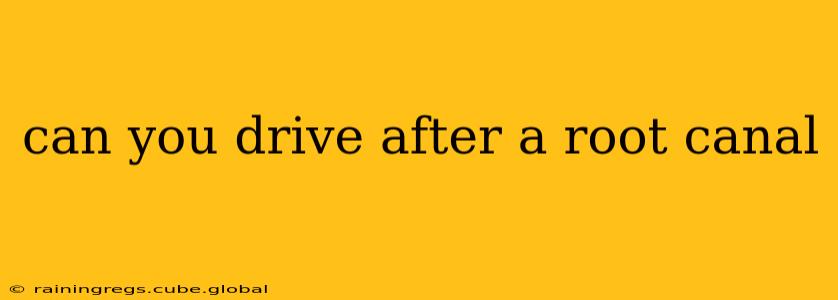A root canal, while a significant dental procedure, doesn't automatically disqualify you from driving. However, the answer to whether you should drive immediately afterward depends on several factors, primarily your reaction to anesthesia and any pain medication prescribed.
This post will delve into the specifics, addressing common concerns and providing a clear, informed perspective on driving post-root canal.
What Happens During a Root Canal?
Before we discuss driving, let's briefly review what a root canal entails. A root canal is a procedure designed to save a severely damaged or infected tooth. The dentist removes the infected pulp (the soft tissue inside the tooth), cleans and shapes the root canals, and then fills and seals them to prevent further infection. This process often involves local anesthesia to numb the area.
Will the Anesthesia Affect My Driving?
This is the most crucial factor. Local anesthesia numbs the mouth, but its effects can sometimes extend beyond the immediate treatment area. You might experience:
- Reduced coordination: The numbness can affect your mouth, tongue, and even your jaw, potentially impacting your ability to control the vehicle safely.
- Drowsiness or dizziness: Some individuals report feeling drowsy or dizzy after the anesthesia wears off. This is particularly true if you're already prone to these feelings.
- Impaired judgment: While less common, the effects of anesthesia can subtly impair judgment, increasing the risk of accidents.
What About Pain Medication?
Many dentists prescribe pain medication, such as ibuprofen or stronger prescription options, to manage post-root canal discomfort. These medications can also affect your ability to drive safely, causing:
- Drowsiness: This is a common side effect of many pain relievers, especially opioids.
- Blurred vision: Some medications can cause blurred or double vision, making driving extremely dangerous.
- Slowed reaction time: Pain medication can slow your reflexes, impacting your ability to react quickly to unexpected situations on the road.
How Long Should I Wait Before Driving?
There's no single answer to this question. The waiting period depends on your individual response to the anesthesia and any medication prescribed. It's crucial to follow your dentist's instructions carefully. They will advise you on when it's safe to drive based on your specific circumstances.
As a general guideline, however, it's best to avoid driving until the numbness from the anesthesia has completely worn off and you feel fully alert and capable of driving safely. This might take several hours. If you've been given pain medication, carefully read the medication label regarding driving and follow the instructions provided by your dentist and pharmacist.
What if I Feel Fine?
Even if you feel perfectly fine, it's essential to err on the side of caution. The subtle effects of anesthesia and medication might not be immediately apparent, yet they could still impair your driving ability. Rushing back to driving could lead to dangerous consequences.
Is it illegal to drive after a root canal?
It is not illegal to drive after a root canal per se. However, it is illegal to drive while impaired, whether by anesthesia, medication, or a combination of both. If you are involved in an accident while driving under the influence of medication prescribed for a root canal, you could face legal repercussions.
What are the risks of driving after a root canal?
The risks associated with driving after a root canal include:
- Accidents: Impaired coordination, drowsiness, and slowed reaction time significantly increase the risk of accidents.
- Injuries: Accidents caused by impaired driving can result in severe injuries to yourself and others.
- Legal consequences: Driving under the influence of medication can lead to legal penalties, including fines, license suspension, or even criminal charges.
In conclusion, while there's no legal prohibition against driving after a root canal, it's paramount to prioritize safety. Always adhere to your dentist's instructions concerning driving after your procedure and prioritize your safety and the safety of others on the road. If you're unsure, it's always better to wait and arrange alternative transportation.
